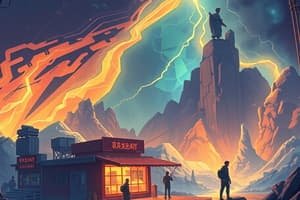Podcast
Questions and Answers
What is consumer economics?
What is consumer economics?
The study of how people deal with scarcity, fulfill needs, and select among alternative goods, services, and actions.
Who are consumers?
Who are consumers?
Individuals or groups such as families who obtain, use, maintain, and dispose of products and services to increase life satisfaction and fulfill needs.
What are 'cabinet castaways'?
What are 'cabinet castaways'?
Products not used immediately after purchase that are slowly pushed to the back of the cabinet and forgotten.
What is consumerism?
What is consumerism?
Who is Adam Smith?
Who is Adam Smith?
Buying or using goods and services is an act of ______.
Buying or using goods and services is an act of ______.
What is injurious consumption?
What is injurious consumption?
What does 'caveat emptor' mean?
What does 'caveat emptor' mean?
Who is Abraham Maslow?
Who is Abraham Maslow?
What are the levels of Maslow's Hierarchy of Needs?
What are the levels of Maslow's Hierarchy of Needs?
What is a household?
What is a household?
Humans need to consume to exist.
Humans need to consume to exist.
What is demography?
What is demography?
What are demographics?
What are demographics?
What are the steps in the 5 step consumer process?
What are the steps in the 5 step consumer process?
What are needs?
What are needs?
What are wants?
What are wants?
What are goals?
What are goals?
What does thinking involve in consumer decision-making?
What does thinking involve in consumer decision-making?
What does planning involve in consumer decision-making?
What does planning involve in consumer decision-making?
What is implementing/acting in the consumer process?
What is implementing/acting in the consumer process?
What is evaluating in the consumer process?
What is evaluating in the consumer process?
What is consumer style?
What is consumer style?
What are the 7 factors of consumer style?
What are the 7 factors of consumer style?
What is economics?
What is economics?
What is real gross domestic product (GDP)?
What is real gross domestic product (GDP)?
What is inflation?
What is inflation?
What is deflation?
What is deflation?
What is the business cycle?
What is the business cycle?
What are the 3 stages of the business cycle?
What are the 3 stages of the business cycle?
What is expansion in economic terms?
What is expansion in economic terms?
Flashcards are hidden until you start studying
Study Notes
Consumer Economics Overview
- Consumer economics studies how individuals manage scarcity, fulfill needs, and make choices among alternatives.
- Consumers are people or groups (like families) who obtain, use, and dispose of goods to enhance life satisfaction.
Key Concepts
- Cabinet Castaways: Forgotten products in cabinets illustrate inefficiency in consumer habits.
- Consumerism: The belief that goods provide meaning and identity within society.
- Adam Smith: Known as the father of modern economics; authored "The Wealth of Nations," arguing for the consumer's role in coordinating economies.
Psychological Aspects
- Faith: Consumption is seen as an act of faith in the value or utility of goods.
- Injurious Consumption: Decisions that adversely affect long-term quality of life stem from poor consumption choices.
Economic Principles
- Caveat Emptor: A principle meaning "let the buyer beware," highlighting consumer responsibility in purchasing.
- Demography: The study of populations, including size, growth, and distribution statistics.
- Demographics: Data that describes populations or sub-groups.
Needs and Wants
- Maslow's Hierarchy of Needs: Levels include physiological, safety, belonging, esteem, and self-actualization.
- Needs: Essential requirements for survival (e.g., food).
- Wants: Desired items beyond necessities (e.g., luxury cars).
Consumer Decision-Making Process
- 5-Step Consumer Process: Involves awareness, thinking, planning, acting, and evaluating.
- Thinking: Involves exploring possibilities and weighing pros and cons.
- Planning: Involves strategizing steps needed to achieve goals.
- Implementing/Acting: Execution of plans, involving actions like product sampling or purchasing.
- Evaluating: Reflecting on consumer satisfaction post-purchase.
Consumer Style Influences
- Consumer Style: Refers to behavioral patterns in financial decision-making.
- 7 Factors Influencing Consumer Style: Include economics, history, culture, personality, environment, technology, and politics.
Economic Indicators
- Economics: The study of production, distribution, and consumption of goods.
- Real GDP: Measures the value of newly produced goods/services in a country, adjusted for inflation.
- Inflation: Represents a consistent increase in prices over time.
- Deflation: Characterized by a decrease in prices.
- Business Cycle: Illustrates economic expansions and contractions across three stages: expansion, recession, and recovery.
Stages of the Business Cycle
- Expansion: Marked by prosperity, growth, low unemployment, and high retail sales.
- Recession: A decline in economic activity and retail performance.
- Recovery: A phase where economic activity begins to rise after a recession.
Studying That Suits You
Use AI to generate personalized quizzes and flashcards to suit your learning preferences.




